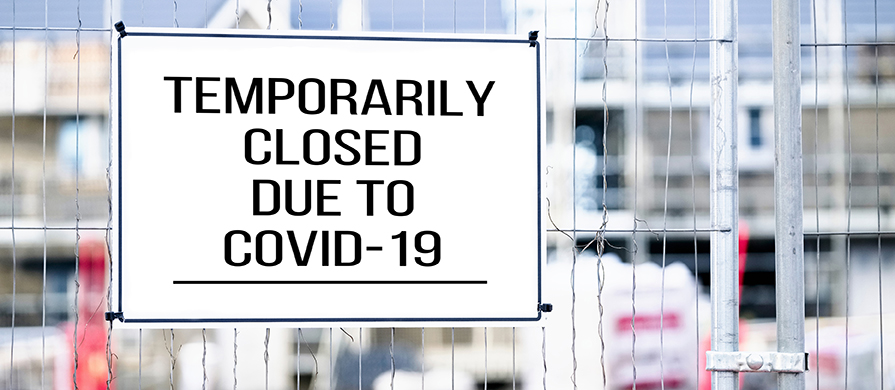
August 19, 2022
Applicability of Change in Law and Cardinal Change Contract Clauses for COVID-19 Impacts in the Construction Industry
This blog post is the fourth in a series of eight that summarize the potential impacts of the COVID-19 pandemic on the construction industry, including the potential applicability of typical contract clauses to the impacts, best practices for mitigation of the impacts, and recommendations for avoiding claims related to COVID-19 in future contracts.
This blog post summarizes information published in articles and blog posts by various attorneys and law firms, and the intent is to provide a brief summary that may be beneficial to owners and contractors. This post is not written by attorneys and does not constitute legal advice.
Several authors discuss the potential applicability of various contract clauses to COVID-19 impacts in the construction industry. Change in law and cardinal change clauses have both been cited as being potentially applicable to COVID-19 impacts as discussed below.
In “Covid to Impact Construction Claims ‘Until at Least 2023’,” 17 August 2021, Junaid Banoobhai and Nesreen Osman of Pinsent Masons discuss the implications of COVID-19 in Europe, the Middle East, and Africa. Banoobhai and Osman state that construction projects typically allow for relief for delays due to changes in law, which in the case of COVID-19 may include lockdowns or quarantines that delay completion, and that the relief may include both extension of time and compensation for costs related to the delay. However, they write that it is not uncommon for a change in law clause to exclude claims where the change in law is due to a force majeure event. Further, they write that problems may arise where a party declares a force majeure event, which typically does not include cost entitlement, prior to a change in law due to COVID being put into effect. They indicate that some jurisdictions have introduced guidelines or legislation to fairly deal with pandemic-related claims and set specific conditions for entitlement.
In “Changing Construction Risk Regimes in Light of COVID-19,” 6 April 2020, David Strickland and Michael Yates of White & Case broadly state that relief for governmental lockdowns and other restrictions has become a key issue in construction projects in the Americas. They indicate that a change in law clause may provide relief if the force majeure clause of a particular contract does not. Strickland and Yates note that the language in change of law clauses, and the associated relief, differ from contract to contract. They write that in some cases, the language in the clause may lead to dispute where, for example, an owner may interpret “applicable law” to limit relief to cases involving changes in statutes and regulations while a contractor may interpret “applicable law” to more broadly include governmental decrees such as COVID-related public health orders. Furthermore, Strickland and Yates note that absolute distinctions between force majeure clauses and change in law clauses may not exist in certain contracts and advise that all parties to a specific contract should carefully evaluate the applicable clauses when evaluating claims stemming from COVID-19 governmental shutdown orders.
In “How Should the Impact of the COVID-19 Outbreak Be Managed on Projects under FIDIC and NEC?,” 31 March 2020, Rebecca Shorter, Charles Nairac, Dr. Markus Burianski, Dr. Dimitar Kondev, and Yasmine El Achkar of White & Casewrite that under clause 13.7 of the International Federation of Consulting Engineers (FIDIC) contract, contractors may be entitled to both an extension of time and compensation of costs if changes in laws impacting the project site cause them to incur costs and delays. Additionally, Shorter et al. note that under Option X2.1 of the New Engineering Contract (NEC), which indicates that a change in law constitutes a compensation event, a contractor may be entitled to time and costs in the event that government legislation impacts the project, e.g., restricts movement of materials or people.
In “COVID-19: The Current Impact on Construction and Engineering Projects,” by Julian Bailey, Nicolas Bouchardie, and Ignacio Madalena of White & Case, 14 April 2020, and “COVID‑19’s Impact on Construction Contracts – Will Force Majeure Relief or Other Rights Be Available?,” by Emma Schaafsma and Michelle Li of Herbert Smith Freehills, 11 February 2020, the authors broadly state that change in law contract provisions may give a contractor the right to both a time extension and compensation for costs incurred in various jurisdictions. In “COVID-19’s Impact on Construction: Is There a Remedy? – Time Extension, Force Majeure, or More?,” The National Law Review, 3 April 2020, William J. Shaughnessy, William E. Underwood, and Chris Cazenave of Jones Walker LLP also write that parties should consider whether a change in law provision may be another remedy for time and cost adjustments or termination in the event that a governmental order or change in law renders performance impracticable or impossible. Additionally, in “Construction Contracts Impacted Now and into Post-COVID World,” Daily Commercial News, Canada, 29 October 2021, John Bleasby cites Sahil Shoor of Gowling WLP as stating that in Canada, changes in applicable law provisions may be used to limit the impact of governmental orders on supply chains and construction but do not address issues related to best practices regarding COVID-19 avoidance and mitigation.
In “Construction Claims in the COVID Era: Lessons Learned and Best Practices,” JD Supra, 22 February 2021, Nicole Giles and Tara Ward of Wiley Rein LLP cite an applicable case, Pernix Serka JV v. Department of State (2020), where a contractor faced delay on a project in Sierra Leone due to an Ebola outbreak. The contracting agency stated that how the contractor chose to manage the outbreak was a business decision and provided an extension of time but no compensation of costs. The contractor sought cost compensation, claiming that the Ebola outbreak constituted a cardinal change, constructive change, and constructive suspension of work. The U.S. Civilian Board of Contract Appeals did not agree, noting that even though the outbreak was unexpected, it was not caused by the government, and the contracting agency did not direct any specific action in response. The authors note that without a directed change from an agency, it may be difficult for contractors to recover under a changes clause for additional procedures due to COVID.
In “Material Cost Escalation, Delays and COVID-19: Managing Risk in Challenging Times,” 20 July 2021, Rachael E. Stack and Carl R. Pebworth of Faegre Drinker write that although force majeure and cardinal change clauses have not historically been used for relief associated with material cost and lead time increases, parties are resorting to these claims due to COVID-19 impacts on supply chains.
Finally, in “COVID-19: Legal Impact on Contractual Obligations,” 30 March 2020, Julia Zagonek and Pavel Boulatov of White & Case discuss material change of circumstances as per Article 451 of the Russian Federation (RF) Civil Code, noting that when a project is impacted by a material change of circumstances, an affected party can demand that the contract is either amended or terminated. Zagonek and Boulatov write that under Article 451 and other special provisions of law, the contractor can request a price increase if there is a significant increase in the cost of materials or equipment and may terminate the contract if the owner refuses this request. Further, the authors write that the contractor must notify the owner of any delays outside of its control, and in the absence of instructions from the owner, the contractor may terminate the contract and claim damages. They note that Article 451 may be engaged in response to COVID‑19 supply chain impacts and that the relevant party must prove that performance would be very difficult or expensive.
As detailed above, several authors discuss the potential applicability of change in law and cardinal change clauses to COVID-19 impacts in the construction industry. As always, fully understanding the specifics of the contract and documenting the impacts contemporaneously are key for supporting (or defending against) potential claims.
ADDITIONAL RESOURCES

Blog
Discover industry insights on construction disputes and claims, project management, risk analysis, and more.
MORE

Articles
Articles by our engineering and construction claims experts cover topics ranging from acceleration to why claims occur.
MORE

Publications
We are committed to sharing industry knowledge through publication of our books and presentations.
MORE
Recommended Reads
Applicability of the Frustration of Purpose Defense for COVID 19 Impacts in the Construction Industry
This is the third post in an eight-part series that summarizes potential impacts of the COVID‑19 pandemic on the construction industry.
READ
Applicability of the Impossibility of Performance Defense for COVID-19 Impacts in the Construction Industry
This is the second post in an eight-part series that summarizes potential impacts of the COVID‑19 pandemic on the construction industry.
READ
Review of American Bar Association Articles Regarding COVID-19 Impact on the Construction Industry
This is the first post in an eight-part series that summarizes potential impacts of the COVID‑19 pandemic on the construction industry.
READ

